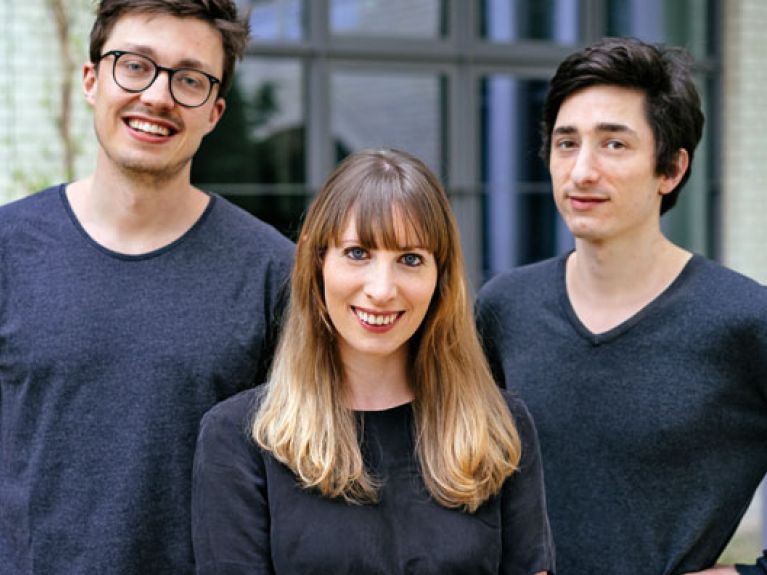Funding to promote good start-up ideas
Entrepreneurs from Israel are invited to link up with networks in the Berlin start-up region: that is the idea behind the new pilot project EXIST-Start-up Germany.

The room in which Yael Biran sits with her colleagues Erik Berndt and Alexander Phleps at Technische Universität (TU) Berlin’s Centre for Entrepreneurship is small. It has been her second home since April 2015. Green and yellow Post-it notes hang on the walls alongside printouts from her website, which has yet to go online. Flag, her start-up company, is set to start trading in October. “And we still have loads to do before then”, says 29-year-old Yael from Israel, who together with her colleagues qualified for EXIST, an internationally unique grant for start-up companies. In 2014 alone, a total of 140 start-up teams across Germany received twelve months of funding thanks to the grant – to be eligible they must be university graduates, prove that they have an innovative idea and be deemed marketable, capable of working in a team and worthy of funding.
The idea that Yael, Erik and Alexander came up with is an app that allows design objects and art in cafés, restaurants and hotels to be identified – and then ordered directly from an online supplier. Using their iBeacon solution, it is possible for example to spot a sofa in a hip café and then buy an identical model right away with a single click on a smartphone. Beacons are tiny Bluetooth transmitters whose signals are received by mobile devices. “Especially in this initial phase we are focusing on local furniture manufacturers, designers and artists in Berlin so as to support the scene here”, says Yael.
Established in 1998, the EXIST funding programme is financed by Germany’s Federal Ministry for Economic Affairs and Energy (BMWI). Start-up companies receive up to 150,000 euros in funding, as well as professional support from consultants, trainers and professors. There are ideas for start-ups in all kinds of sectors – many of them target the chemical or technology industry, IT or the world of fashion. Although most of the teams to date have been from Germany, they frequently also involve international university graduates like Yael, who moved from Tel Aviv to Berlin. As of February 2016, there are certain to be even more Israelis among the EXIST grant-holders, as the programme “EXIST-Start-up Germany – Israel” will then be open for two years to young entrepreneurs from Israel wishing to start a new business in the Berlin region. Israel is the programme’s first partner country. “This presents new opportunities for both nations”, says Agnes von Matuschka, who runs the Centre for Entrepreneurship at the TU Berlin, which is responsible for coordinating the pilot project. Partners in Israel include BETATEC (Berlin Tel Aviv Technology and Entrepreneurship Committee) and StarTAU, a student-initiated entrepreneurship centre at Tel Aviv University.
“Israelis tend to act more spontaneously”, says EXIST project manager Lisa Breford. “Which could also benefit German teams.” – “And many have an extensive network”, adds Agnes von Matuschka. “This allows start-ups to put their idea to the test much more quickly, and to get help in a matter of minutes whenever they need it.” Among other things, Germany can offer the Israelis an interesting location – a country boasting a big market at the heart of Europe. The programme aims to forge closer links between the large Israeli start-up scene and its German academic counterpart – especially in the Berlin region – and to promote exchange between technology-oriented entrepreneurs in both countries.
At the end of June, TU Berlin President Professor Christian Thomsen and BMWI Parliamentary State Secretary Brigitte Zypries presented “EXIST Start-up Germany – Israel” in Tel Aviv. “There was considerable interest among university graduates, and we are now excited about seeing who will apply”, says Thomsen. Israelis interested in taking part in the programme can apply from October 2015. Candidates who make it to the next round will be invited to spend three days in Berlin, where their business plan will be reviewed once again by experts. Finally, each team will pitch its idea to representatives of the Berlin and Potsdam university start-up services. The jury will then pick the finalists for “EXIST-Start-up Germany – Israel” and match them with the German university best-suited to their idea as well as with a mentor. If necessary, the Israeli entrepreneurs can invite German team members to come on board. If their application is successful, the Israelis will enjoy the same support as any other EXIST team.
As Agnes von Matuschka explains, not all teams that qualify for the EXIST grant actually end up starting a new business: “Around 70 percent survive.” One of these is the Israeli TU graduate Matan Beery. He and his team founded Akvola, a start-up which has developed special technology with a view to making seawater desalination affordable. “It is great that EXIST makes it possible to further develop scientific ideas”, he says. The team is now able to finance itself and has an established client base. “However, we still need to further evolve”, he says, “and become more international”. Yael Biran also hopes that Flag and her team will prove successful. “We would never have got this far without EXIST”, she says. “It takes considerable time to think in different directions. It would not have been possible to do this while holding down a day job.” ▪
For newsletter and applications, visit existstartupgermany.com

